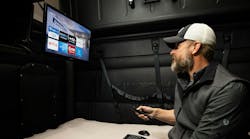Let's give the President the fast-track authority fast.
Largely obscured by the flash-dance surrounding this summer's landmark initiatives to balance the federal budget and trim taxes, but no less important to the country's long-term economic prosperity, is the push to expand international trade.
Cynics may snipe that the budget agreement was made easy by America's economic resurgence, allowing tough political choices to be postponed. They have a point. But let not that political cynicism infect our thinking when it comes to free trade.
Not only has trade helped hone American productivity, it has opened up new markets to American goods and services. Today, foreign trade accounts for nearly 12% of the nation's economic activity. Granted, trucking does not participate fully in every leg of these movements. Yet growing international demand forces trucking into new areas of growth.
More smart moves will help enhance that position. The first came when Congress extended normal trade relations with China. Despite the accentuated public hand-wringing over some highly charged issues, most-favored-nation trading status to China cleared by a 259-173 margin in this annual ordeal. The only cloud around this silver lining is that the level of support has dropped from earlier years.
This month, we come to another critical juncture. President Clinton is seeking authority to negotiate free-trade agreements on a fast track. It's a move we should support.
Fast track simply gives the President the ability to negotiate trade agreements, unencumbered by special interests that often sneak into such pacts when Congress gets involved. Once concluded, the Administration would bring the trade deals back to Congress for a thumbs-up or a thumbs-down, without amendment.
Chile and most of the other Latin American countries are at the head of the line eager to join a free-trade bloc with the U.S.
But their patience is being tested by numerous interests that are fighting the expansion of free trade here in the U.S. From the neo-isolationists on the right to labor and environmental groups on the left, the voices are growing louder.
And having more of an impact. According to a Wall Street Journal/ NBC News poll conducted in July, respondents opposed giving the President fast-track authority by a 2-to-1 margin.
Some of the foot-dragging is the political backwash from NAFTA. Opponents are quick to come forward with dramatic cases of plant closings and job losses.
But there are plenty of good stories. Like Fisher Price, which opened a new plant in Monterrey to make toys for the U.S. market. Previously, the company had been filling the pipeline from Hong Kong. That move has helped Celadon Trucking grow its partnership with Fisher Price.
Even though the Clinton Administration, in a nod to the Teamsters Union, has delayed implementing the trucking provisions of NAFTA, it nevertheless produced a study in July that refutes the claims of the giant sucking sound that was supposed to occur as U.S. jobs headed south.
The time has come to export that success. The more we train our sights on the economic opportunities that exist abroad and the more we train ourselves to compete in the global arena, the more we truck.
Let's get on the fast track now.


